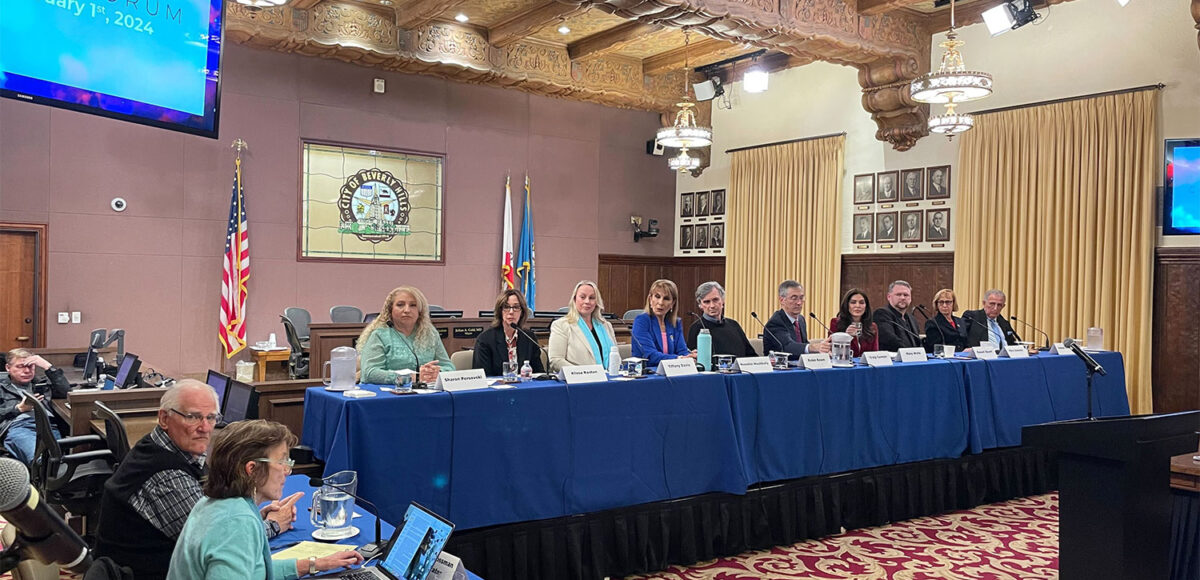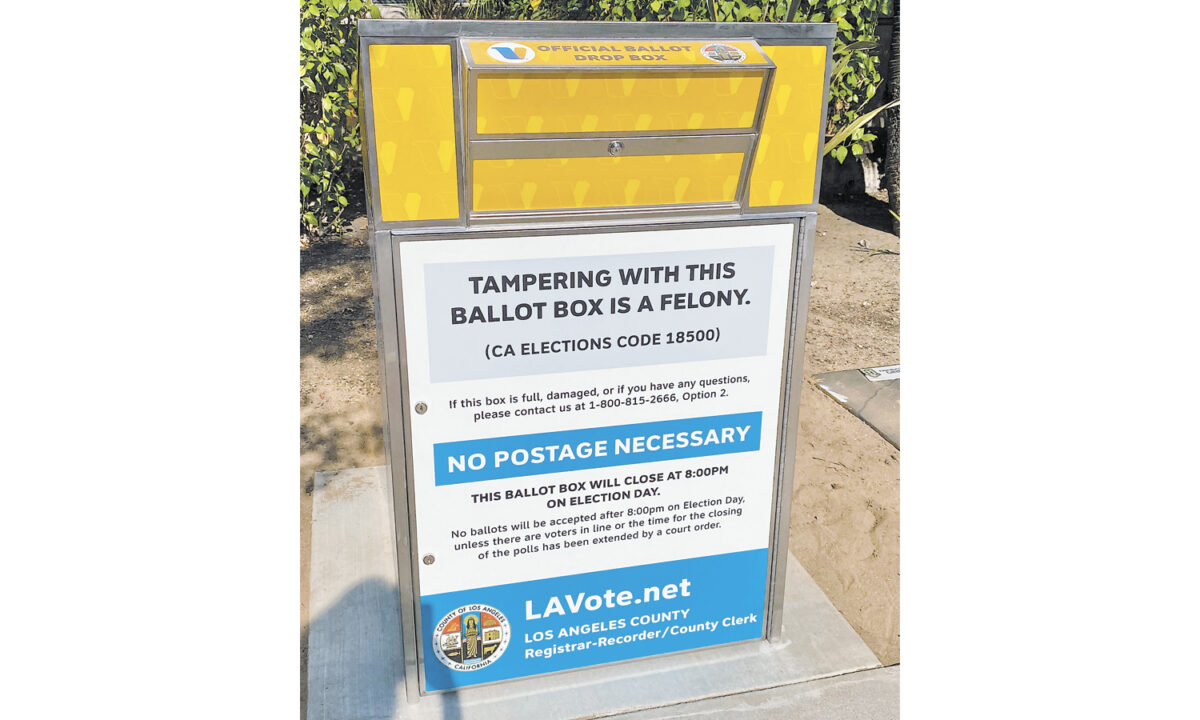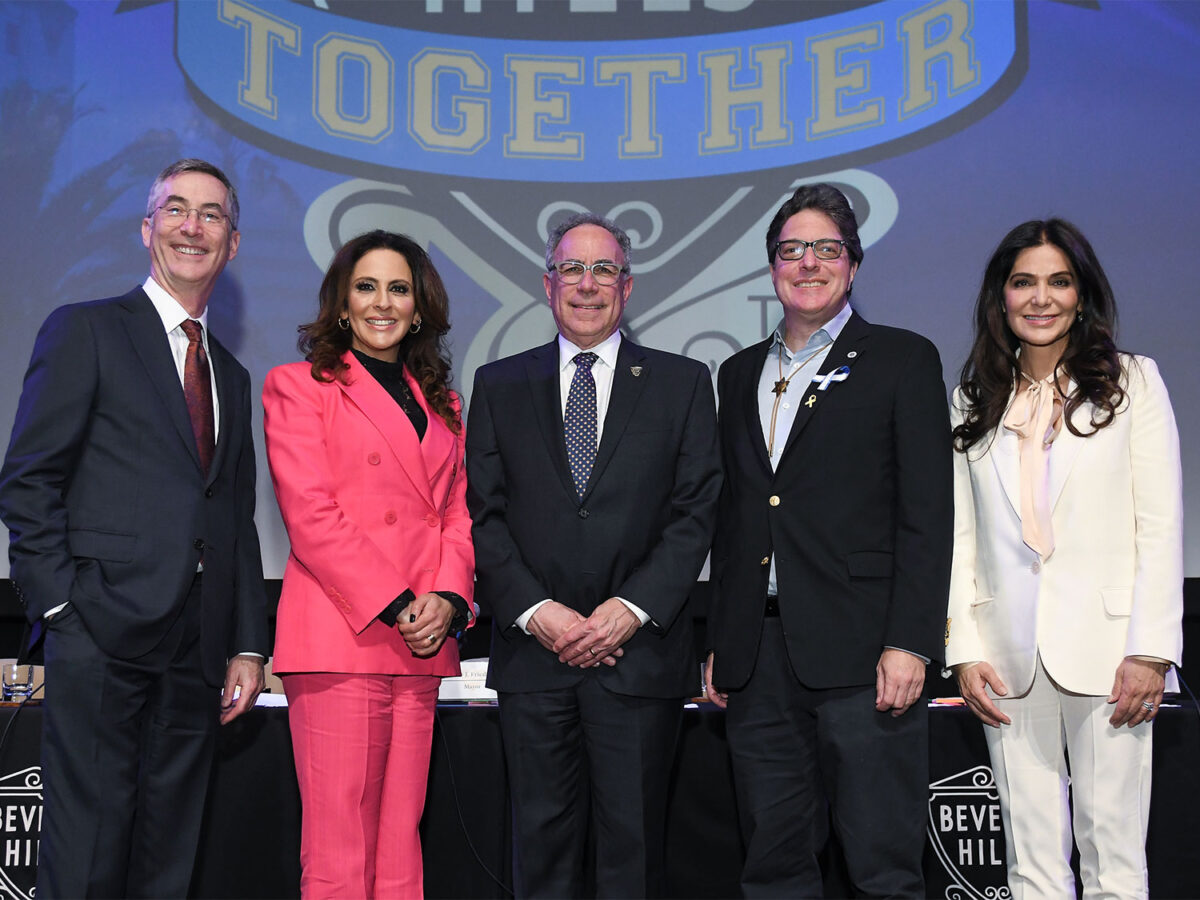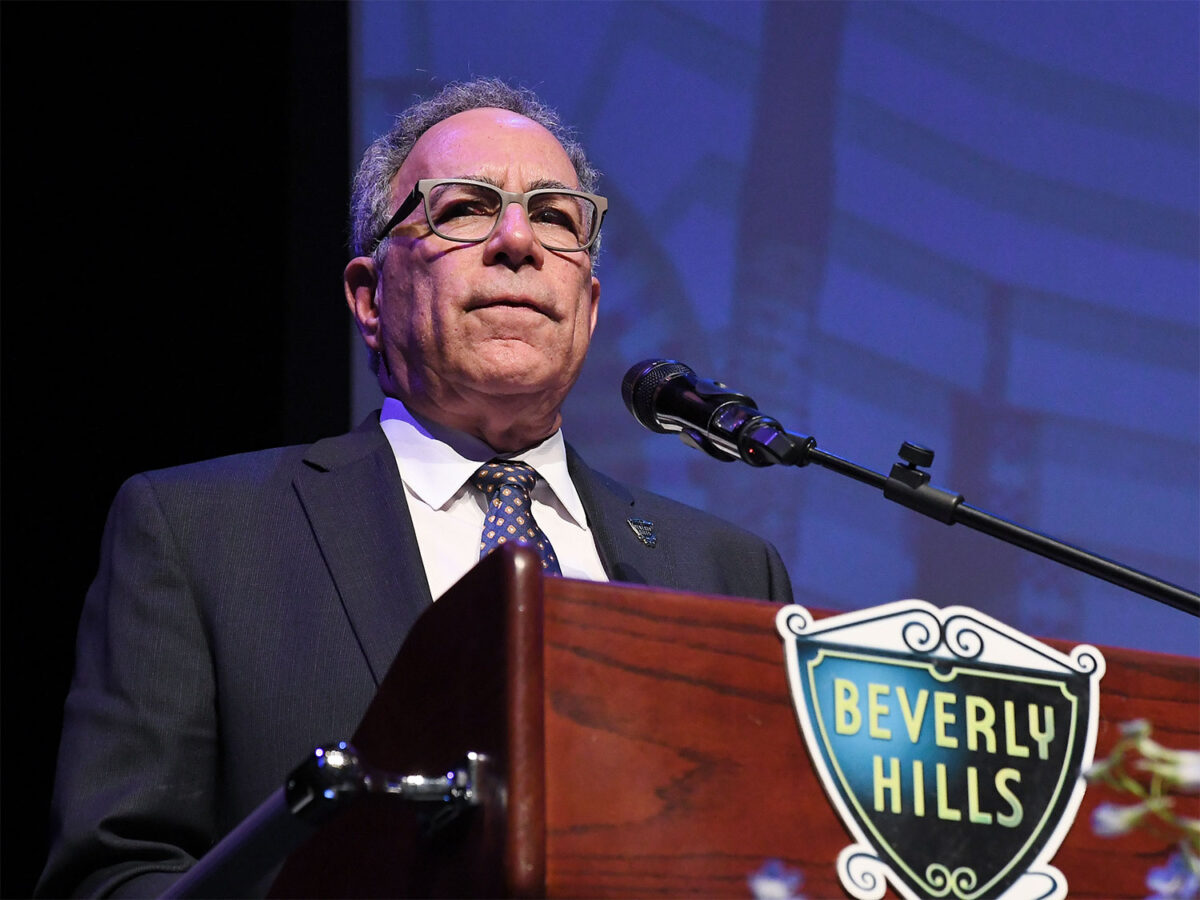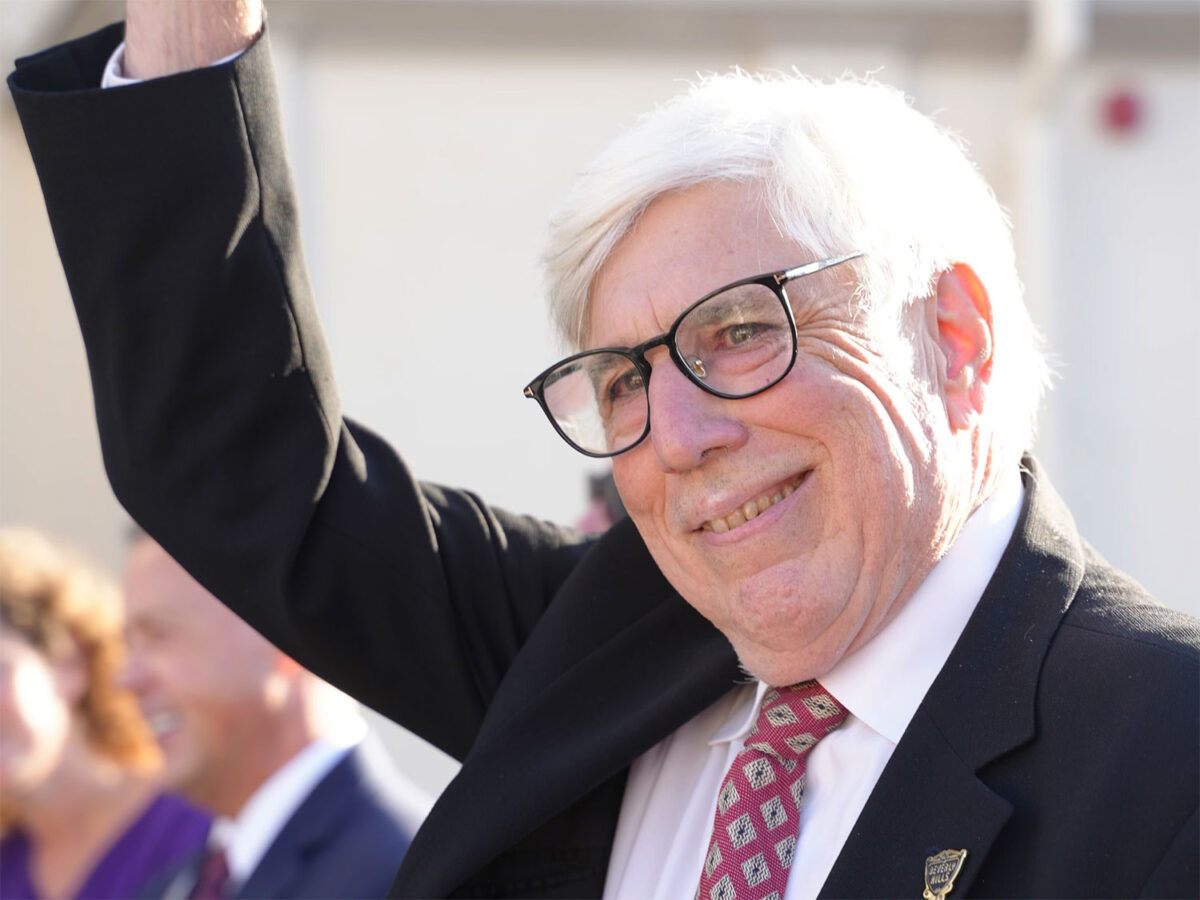All 10 candidates vying for the two open seats on the Beverly Hills City Council gathered at City Hall on Feb. 1 for a wide-ranging forum hosted by the Southwest Beverly Hills Homeowners Association. The forum marked the first time that all candidates sat on the same panel.
Even though some tense moments arose when audience members clashed with the Association’s President Ken Goldman, he told the Courier he was pleased with the event. Audience members walked away with a clear understanding of each candidate’s positions, said Goldman. He also thought the discussion about the housing element and the impacts of development in the Southwest region were particularly helpful.
“The audience could get a pretty good feeling of the positions of each candidate and whether they were on top of civic affairs,” said Goldman.
Andrea Grossman, the well-known founder of Writers Bloc Presents, moderated the panel. She began the discussion by asking each candidate to make a brief opening statement before asking questions about issues including public safety, the housing element, the Metro Purple (D Line) Extension project, bike lanes, planning and development and reproductive rights.
During opening statements, candidates touted their community ties, professional successes and histories of public service.
Sharon Persovski highlighted her career as an environmental designer and experience as Architectural Commissioner. Craig Corman said his law career would be especially beneficial in navigating city business, and Tiffany Davis said her experiences renting in Beverly Hills and living in similar cities provides her with a unique perspective.
Russell Stuart emphasized his unique background. Born in Vancouver, Canada, Stuart said he is the only military veteran and registered Republican running for council, and he takes a conservative approach to city issues.
In his opening statement and throughout the forum, Robin Rowe positioned himself as the “progressive” candidate, offering proposals—such as building a gondola to ease traffic—that he said would provide new solutions to old problems.
For her first question, Grossman asked the panelists to explain the two primary initiatives they would tackle if elected, and how they would pay for them. Certifying the housing element, increasing public safety, preparing for the Metro opening and improving communication emerged as the overarching goals, though the candidates presented different plans for achieving them.
Alissa Roston said she would hire more officers to crack down on speeding. Nooshin Meshkaty said she would convene a focus group to help certify the housing element. Mary Wells indicated that she would establish a Metro Beverly Hills Police Department unit and Myra Demeter would work collaboratively to plan for the Metro opening.
“We are going to be the terminal station for a few years,” Demeter said. “We know there’s documented crime, there’s drugs, there’s homeless people. They will be taken off the train at our stations for a couple of years. We have to deal with that. We need a committee. It cannot be done by me or anybody alone.”
Grossman then gave the candidates 20 seconds to explain how they would fund these proposals. Many advocated for finding efficiencies in the city budget and reviewing consulting contracts, while Roston said she would create a vendor oversight committee to review third-party contracts and Wells advocated for zero-based budgeting.
Though the candidates frequently discussed the housing element in relation to other issues, Grossman asked the candidates to specify what the city can do to certify the housing element and identify where affordable units can be zoned.
Corman said that the city’s previous attempts to certify the housing element by converting commercially zoned areas into mixed-use zoned areas had failed, and the only way to satisfy the requirements is to plan for taller, denser buildings in certain parts of the city.
Though he said these locations need to be discussed by the community, he identified the five acres of city-owned land in the industrial section and the tennis court building on La Cienega Boulevard as viable options.
“I agree with Craig that we could look at parts of the city where we could go higher,” Roston said, adding that a new ordinance aimed at encouraging adaptive reuse in the mixed-use overlay zone could also meet state requirements.
Grossman also asked candidates how they would handle quality of life concerns arising from major developments planned near residential areas, and if their decisions would be influenced by increased city revenue.
There was broad consensus on the importance of improved community outreach, and some candidates discussed how they had led previous outreach efforts. Meshkaty said she had organized community meetings while serving on the Beverly Hills School District Board of Education and working to pass Measure E, and Corman talked about how he weighed community concerns while evaluating projects before the Planning Commission.
“Minimizing negative impacts on residents from development is obviously one of the primary goals of the city of the Planning Commission,” Corman said. “Are there going to be projects where you can’t minimize the impacts enough? Yes, and those projects you have to say no [to].”
Stuart, who owns Beverly Hills Guns, said he approached the question from the perspective of a business owner.
“Yes, I’ve talked to hundreds of residents who are concerned about the small village feel of the city [and] overdevelopment,” Stuart said. “But to sit here and say that the financial side of things doesn’t matter—of course it matters. Every single question you’re probably going to ask is, ‘Well, how do you pay for it?’ Well, this is how you pay for it. It is revenue generating projects.”
Architect Hamid Omrani, however, said the city should pursue different revenue streams, specifically by building more parking structures, which would have the added benefit of reducing congestion, he added.
“We have to go to [a] solution totally different, and we have to work on it,” Omrani said.
Many of Grossman’s questions were focused on issues specific to Southwestern neighborhoods, and she asked how the candidates plan to improve the Southwestern business corridor while addressing challenges arising from the Metro.
Davis said it is crucial to establish a strong police and surveillance presence near the Wilshire/La Cienega and Wilshire/Rodeo stations, and that certifying the housing element could also be an opportunity to build more mixed use-development in the Southwest.
Corman added that security near Metro stations is paramount, and that the La Cienega area would be a logical place to plan for taller, denser structures. Doing so could “potentially create a new urban core and revitalize that whole stretch,” he said
Demeter noted that addressing safety concerns begins with implementing wayfinding services at the stations, and the city needs to encourage family-oriented businesses in the Southwest that visitors will want to explore.
More parking is also a necessity for reducing traffic, according to Omrani. There are few options for residents to park near the Metro, use the subway, and then return to their cars and drive home, he said, adding that delivery and ridesharing services will likely worsen congestion in the area.
“We have to find a solution to resolve it,” he said. “The city will be [a] mess.”
Roston said she was “disturbed” by the lack of high-level planning around the Metro opening and that city leaders need to work with Los Angeles County and city officials to devise a comprehensive plan.
Keeping the conversation focused on the Southwest, Grossman also asked candidates about their positions on the bike lanes at Roxbury Park and how they would implement bike lanes in residential areas.
Rowe, an avid biker, said riding a bike in Beverly Hills is “suicidal,” and called the lanes near Roxbury Park “a road to nowhere,” though he didn’t provide a proposal for implementing new lanes.
Corman said that creating a protected bike lane on Roxbury Drive would not work because it would endanger motorists, and he said protected bike lanes should be reserved for major boulevards. Wells agreed that bike lanes are not a good fit for Roxbury Drive and added that the city should adopt a comprehensive bike plan, while Demeter called for a “complete streets” plan in which bike lanes in Beverly Hills connect to lanes in neighboring cities.
Grossman’s last question elicited the crowd’s biggest reaction. After asking for the candidates’ stances on abortion, Grossman asked how they would handle anti-abortion protests in the city, and if they would work to block clinics from opening if faced with the threat of disruptive protests.
Most of the candidates said they were proudly pro-choice and would not be swayed by protesters. Omrani declined to answer, and Stuart said that though he is not anti-abortion, he is “not pro-choice when it comes to abortions right up to the baby’s birth.”
After Grossman finished her questions, several residents lined up to ask questions of their own.
One resident asked the candidates to envision Beverly Hills in three years and explain how they will bring that vision to fruition. Davis said the city needs a “facelift,” Meshkaty said she hopes to spearhead more senior and affordable housing, while Demeter spoke of the importance of “opening the lines of communication,” starting by reinstating longer public comment rules at City Council meetings.
A tense moment came during a confrontation between Goldman and Mark Elliot, founder of the Beverly Hills Renters Alliance, over the amount of time allotted for audience questions. Elliot then asked the candidates to identify a tenant concern and how they would address it.
Roston said she has spoken with many tenants who complain that their units are not being maintained and advocates for random habitability inspections, while Davis said she would work to rehabilitate the city’s aging housing stock and serve as a voice for renters like herself.
Corman said he also favors random habitability inspections and would ensure that renters in aging, affordable units are not displaced by efforts to comply with statewide housing laws.
The last question of the night came from Wendy Klenk, founder of the Robertson Boulevard Special Task Force, who asked the candidates whether they support an ordinance to protect the city’s urban forest.
After pressing the candidates for a yes or no answer, Klenk was admonished by Goldman for infringing on the other audience members’ time. The forum was then called to a close.



